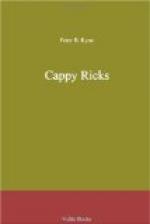When the vessel had been made fast to the mill dock Matt Peasley walked forward to meet his mate.
“What about this cargo of ours?” he demanded. “Remember, I’m new to the lumber trade on this coast. I have never handled any kind of piling.”
“Then, sir, you’re going to get your education like the boa constrictor that swallowed the nigger—all in one long, slimy bite.”
He gazed at his boyish skipper appraisingly.
“No,” he murmured to himself; “I can’t do it. I like you for the way you whaled that big Swede in Cape Town, but this is too much.”
“Why, I don’t find the odor so very unpleasant,” the master declared; “in fact, I rather like it, and I know it’s healthy, because I remember, when my brother Ezra had pneumonia, they burned creosote in the room.”
“Oh, nobody objects to the smell particularly, sir, though it’s been my experience that anybody can cheapen a good thing by overuse—and we have three months of that smell ahead of us. It’s the taste that busts my bobstay.”
“Why, what do you mean?”
“Well, you see, sir, the odor of creosote is so heavy it won’t float in the air, but just settles down over everything, like mildew on a pair of boots. So it gets in the stores and you taste it. You can store flour below deck aft and creosoted piling on deck for’d—and you won’t be out two weeks before that flour is spoiled. Same way with the tea, coffee, sugar, mush, salt-horse—everything. It all tastes of creosote; and then the damned stuff rubs off on the ship and ruins the paintwork. And if the crew happen to have any cuts or abrasions on their hands they’re almost certain to get infected with the awful stuff, and you’ll be kept busy doctoring them. Then, the first thing, along comes a gale and you’re shorthanded, and there’s the devil to pay.”
“Aye!” Mr. MacLean interrupted solemnly. “I dinna care for creosote mysel’, sir; so, wi’ your kind permission, I’ll hae ma time—an’ I’ll hae it noo.”
Matt Peasley bent upon the recalcitrant Scotchman a withering glare. “Very well, Mr. MacLean,” he said presently, “I never could sail in the same ship with a quitter; so you might as well go now, when we can part good friends.” He turned to Mr. Murphy. “How about you, Mike? Are you going to run out on me, too?”
Now, as between the Irish and the Scotch, history records no preponderance of courage in either, for both are Gaels and a comparison is difficult.
However, Scotchmen are a conservative race and will walk round a fight rather than be forced into it, while all that is necessary to make an Irishman fight is to impugn his courage.
Mr. Murphy had seen the fight ahead of the Retriever and he did not blame Mr. MacLean for side-stepping it. Indeed, he had intended pursuing the same course; but Matt Peasley, by his latest remark, had rendered that impossible. To desert now would savor of dishonor; and, moreover, Matt Peasley, though master, had called him by his Christian name. Mr. Murphy touched his forelock respectfully.




